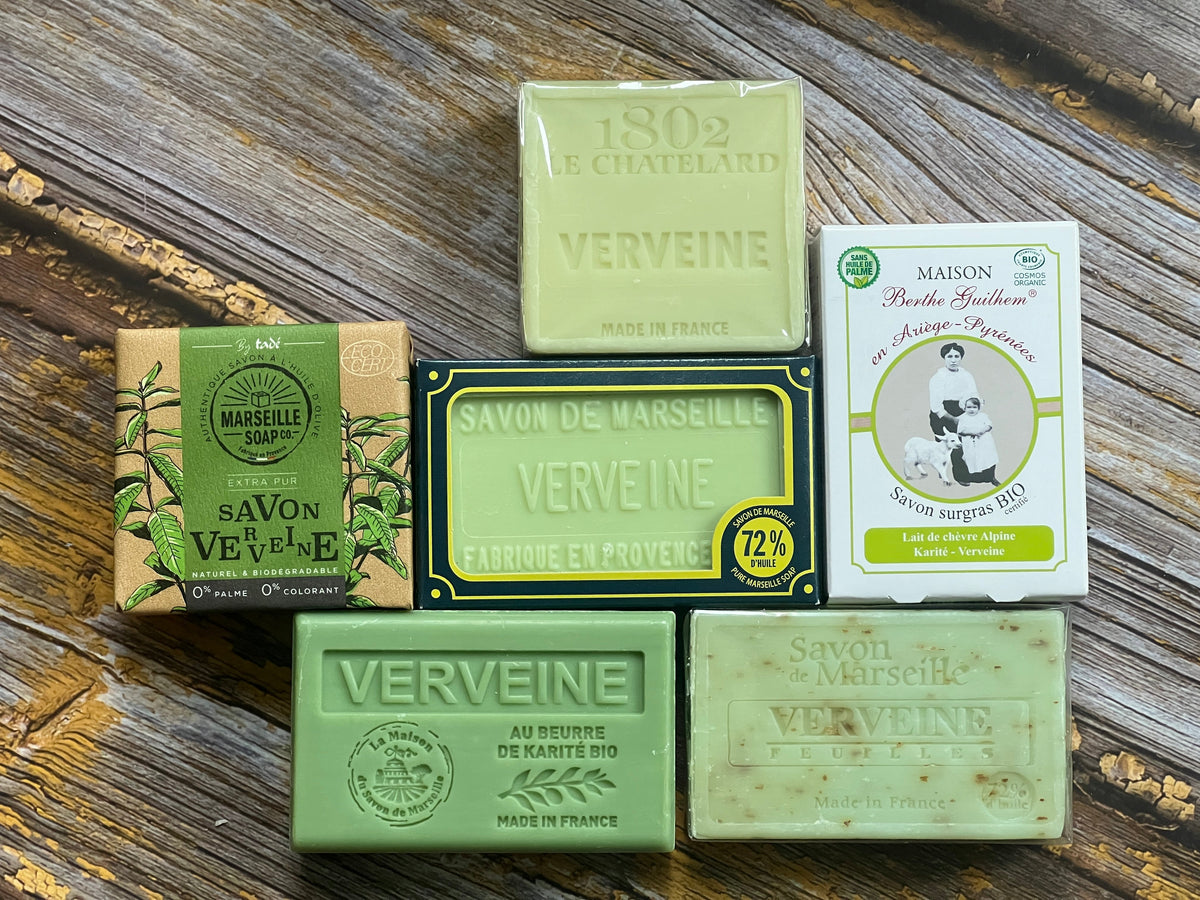

Gifting couldn't be easier
Add a gift message to be emailed to when their parcel arrives, or at a time of your choice.
French soap has long been cherished for its purity, craftsmanship, and timeless appeal. From the sun-soaked fields of Provence to the historic soapmakers of Marseille and the pristine mountain traditions of the Alps, each region brings its own heritage, ingredients, and character.
At French Soaps UK, we really happy to help you choose the perfect soap for your home, body, and lifestyle. Let’s explore the benefits (and a few drawbacks) of the most popular natural bases used in French soap bars, so you can find your perfect match.
History & Tradition: Made for over 600 years, Savon de Marseille is the original French soap. Traditionally crafted in large cauldrons using only olive oil, alkaline ash, and Mediterranean sea salt.
Qualities: 100% natural, biodegradable, fragrance-free, and incredibly gentle on the skin. A true zero-waste essential.
Best For: Sensitive skin, babies, allergies, eco-friendly households, and multipurpose cleaning (laundry, stain removal, household surfaces).
Format: Comes in iconic 300g or 600g cubes, solid bars, and now liquid soap.
Inspiration: Provence is famous for its lavender, verbena, rose, and citrus groves. These local botanicals inspire the scents and colours of traditional soaps.
Qualities: Enriched with shea butter, almond oil, or other plant oils for added skincare benefits. Often triple-milled for a long-lasting, creamy lather.
Best For: Everyday bathing, gifting, and bringing the sensory joy of Provence into your bathroom.
Format: Available in beautifully fragranced bars, liquid soaps, and gift sets.
Inspiration: The French Alps offer pristine air, crystal-clear waters, and medicinal mountain plants such as edelweiss, arnica, and pine.
Qualities: Soaps from this region often feature natural extracts known for their protective and soothing qualities, designed to nurture skin exposed to harsh climates.
Best For: Dry or weathered skin, refreshing after outdoor activity, and those who love crisp, clean, invigorating scents.
Format: Bars and liquid soaps enriched with alpine botanicals, perfect for both skin care and everyday handwashing.
For Sensitive Skin: Marseille cube soap (olive oil base, unscented).
For Everyday Luxury: Fragranced Provençal soaps with shea butter.
For Outdoor Living & Freshness: Alpine soaps with herbal extracts.
For Eco-Friendly Homes: Marseille soap blocks (for skin, laundry, and household cleaning).
For Gifting: Artisanal Provence soaps in lavender, rose, or citrus – always beautifully presented.
Benefits:
Extremely gentle, ideal for sensitive skin
Non-comedogenic (won’t clog pores)
Naturally high in antioxidants and vitamins A & E
Traditional and biodegradable
Texture & Feel: Creamy but low-lather; may feel “slippery”
Best For: Sensitive, mature, or dry skin
Drawbacks:
Less foamy compared to coconut oil-based soaps
Can feel too mild for oily skin or heavy cleansing needs
Benefits:
Excellent cleansing power
Creates rich, bubbly lather
Antibacterial and antifungal properties
Great for oily or acne-prone skin
Texture & Feel: Light and airy with strong foaming action
Best For: Normal to oily skin, body bars, summer use
Drawbacks:
Can be too drying for dry or sensitive skin if used alone
Best when blended with other oils like olive or shea
Benefits:
Gently exfoliates with natural lactic acid
Moisturizing and soothing for dry, irritated skin
Rich in fatty acids and probiotics
Naturally pH-balanced to human skin
Texture & Feel: Smooth, velvety, soothing foam
Best For: Dry, sensitive, or flaky skin
Drawbacks:
Not vegan-friendly
Needs proper drying between uses to avoid softening
Benefits:
Luxuriously creamy and moisturizing
Packed with vitamins (A, B1, B2, B6, C, D, E)
Known for anti-aging, regenerative effects
Historically used by Cleopatra
Texture & Feel: Silky, rich, almost lotion-like
Best For: Mature, sensitive, or eczema-prone skin
Drawbacks:
Typically more expensive
May not be vegan-friendly
Rarely used in high concentrations
Benefits:
Ultra-moisturizing and protective
Rich in fatty acids and vitamins A, E, and F
Soothes eczema, dermatitis, and dry patches
Enhances lather and creaminess
Texture & Feel: Silky, nourishing, luxurious skin-feel
Best For: Dry, cracked, or winter-weathered skin
Drawbacks:
May feel heavy on oily skin types
Can soften more quickly in humid environments
Benefits:
Lightweight yet deeply hydrating
Naturally rich in Vitamin E
Soothes irritation and improves skin tone
Light sweet aroma
Texture & Feel: Soft and smooth, fast-absorbing moisture
Best For: Sensitive, itchy, or inflamed skin
Drawbacks:
Not suitable for those with nut allergies
Less common in high concentrations (often blended)
Benefits:
Lightweight, fast-absorbing hydration
High in linoleic acid—great for inflammation and acne
Non-greasy and gentle
Often used to soften bar texture
Texture & Feel: Light, balancing, mild lather
Best For: Combination or acne-prone skin
Drawbacks:
Often used in blends, not as a standalone base
Lower lather volume than coconut-based soaps
Benefits:
Naturally antibacterial and antifungal
Soothes eczema, psoriasis, and acne
Offers a uniquely herbal, slightly spicy scent
Often used in medicinal or therapeutic soaps
Texture & Feel: Smooth, gently astringent, with a refreshing “clean” finish
Best For: Problematic, oily, or inflamed skin; scalp conditions
Drawbacks:
Can be too astringent or drying for very sensitive or dry skin types
Has a strong, herbal aroma that may not appeal to all
More expensive—often found in premium or niche soaps
| Dry | Shea Butter, Goat Milk, Laurel Oil, Donkey Milk, Olive Oil |
| Sensitive | Olive Oil, Almond Oil, Goat Milk, Laurel Oil |
| Oily/Acne-Prone | Laurel Oil, Coconut Oil, Sunflower Seed Oil |
| Mature | Donkey Milk, Olive Oil, Shea Butter, Laurel Oil, Goat's Milk |
| Combination | Almond Oil, Sunflower Seed Oil, Laurel Oil, Shea Butter |
Bleu Jaune – Artisan soaps made in Provence with traditional methods and high natural oil content. Known for beautiful packaging and premium formulations using olive oil, shea butter, and essential oils.
Tadé du Pays du Levant – Specialist in authentic Aleppo soaps with laurel oil and olive oil, made using ancestral Levantine techniques. Excellent for sensitive and problem skin.
La Corvette – Historic soapmaker from Marseille crafting traditional Marseille soaps with eco-responsible processes.
Fer à Cheval – One of Marseille’s oldest soap factories (est. 1856), offering traditional olive oil-based soaps with high purity.
Le Chatelard 1802 – Lavender farmers known for beautifully scented French-milled soaps enriched with Almond, Coconut & Olive Oils, offering a creamy lather and elegant fragrances.
La Maison du Savon de Marseille – Offers a wide variety of soaps made in France, including scented and unscented options in multiple formulations and sizes.
FRENCH SOAPS SAY:
From the markets of Provence to the ateliers of Marseille, French soaps have earned global love for their gentle, natural ingredients and traditional craftsmanship. But with so many formulations available—like olive oil, donkey milk, and shea butter—we hope we have helped you find the most suitable options for you.
©️ French Soaps UK 2025
If you would like help shopping this article, or have further product or ingredient questions then please contact us and we will be happy to help. E. bonjour@frenchsoaps.co.uk T. 01423 803080
Telephone or Whats App: 01423 803080
Email: bonjour@frenchsoaps.co.uk
Social: @FrenchsoapsUK
Address: Unit 14 Ousegill Business Park, Carr Side Road, Great Ouseburn, North Yorkshire, YO26 9AE
Sign up for our newsletter and get all the latest news, offers and more delivered straight to your inbox. You can unsubscribe at any time. By 'submitting' you are agreeing to our T&C's and Privacy Policy.

Gifting couldn't be easier
Add a gift message to be emailed to when their parcel arrives, or at a time of your choice.



